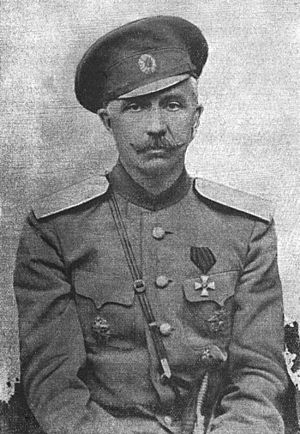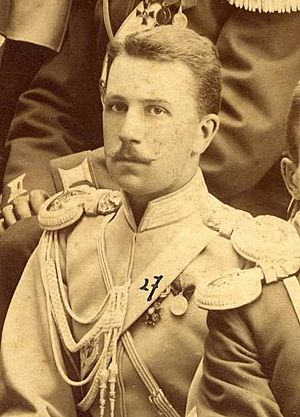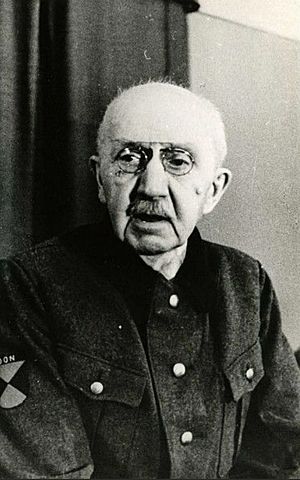Pyotr Krasnov facts for kids
Quick facts for kids
Pyotr Krasnov
|
|
|---|---|

Lieutenant-general Pyotr Krasnov, before 1919
|
|
| Born | 22 September 1869 Saint Petersburg, Russian Empire |
| Died | 16 January 1947 (aged 77) Moscow, Russian SFSR, Soviet Union |
| Cause of death | Execution by hanging |
| Allegiance | |
| Service/ |
|
| Years of service | 1888–1945 |
| Rank | Generalleutnant |
| Battles/wars | Russo-Japanese War World War I Russian Civil War World War II |
| Awards | see awards |
| Signature | |
Pyotr Nikolayevich Krasnov (Russian: Пётр Николаевич Краснов; 22 September 1869 – 17 January 1947) was a Don Cossack officer and historian. He became a Lieutenant General in the Imperial Russian Army during the Russian Revolution of 1917. After the revolution, he was a leader of the White movement, which fought against the Bolsheviks. Later, during World War II, he worked with Nazi Germany and helped organize Cossack forces to fight against the Soviet Union. He was motivated by the harsh treatment of Cossacks by the Soviet government, including forced changes to their culture and land.
Contents
Early Military Career
Pyotr Krasnov was born in Saint Petersburg on September 22, 1869. His father and grandfather were also generals. In 1888, Krasnov finished military school and joined the Imperial Russian Army. He served in the special Life Guards regiment of the Ataman Cossacks.
Krasnov also worked as a correspondent for the Imperial Russian Army's newspaper, Russkii Invalid. In 1902, he wrote articles about his travels in Mongolia, China, and Japan. He shared his thoughts on the Japanese army, though some officers felt his views were too quick and not fully accurate.
During World War I, Krasnov led a Cossack brigade and later a cavalry corps. In October 1917, after the October Revolution, he was appointed commander of Cossack troops by Alexander Kerensky, the head of the Russian Provisional Government. Krasnov marched on Petrograd to try and stop the Bolshevik uprising. However, his forces were surrounded, and he was captured, though he was soon released. After this, he went to the Don River region.
Russian Civil War
After being released, Krasnov went to the Don region. In May 1918, he was elected as the Ataman (leader) of the Don Cossack Host. He wanted to use the Russian Civil War to help the Cossacks gain more independence.
Krasnov received support from Germany, which helped him equip his army. By mid-1918, his Don Army had about 40,000 soldiers. They successfully removed the Soviets from the Don region. Krasnov even wrote to German Emperor Wilhelm II, saying the Cossacks had always been friends with Germany.
Krasnov's relationship with the main White movement forces, led by General Anton Denikin, was difficult. Krasnov wanted to be the supreme commander of all White forces, but Denikin refused. Krasnov also wanted Denikin to attack the city of Tsaritsyn (now Volgograd) to protect the Don region from the Soviet Red Army. Denikin, however, had other plans and moved his army south.
In late 1918, Krasnov tried to capture Tsaritsyn on his own but was defeated. After this loss, he returned to the Don region and still refused to fully cooperate with Denikin unless he was made the supreme commander. After Germany lost World War I in November 1918, Krasnov sought help from the Allied powers. However, the Allies only sent weapons to Denikin's Volunteer Army, which then decided if the Don Cossacks would receive any. In January 1919, Krasnov had to accept Denikin's authority over the White movement because of this lack of direct Allied support.
Life in Exile
On February 19, 1919, Krasnov left Russia and went to Western Europe. He first lived in Germany and then moved to France in 1923. There, he continued his activities against the Soviet government. He also helped start an anti-communist group called the Brotherhood of Russian Truth.
While in exile, Krasnov wrote many books, including his famous trilogy From Double Eagle To the Red Flag. This series tells the story of the Russian Revolution and Civil War through the eyes of many different characters. He also wrote historical novels about Cossacks, like their resistance to the French invasion of Russia in 1812 and the conqueror of Siberia, Yermak Timofeyevich. His books were translated into many languages, making him a popular writer.
World War II and Collaboration
During World War II, Krasnov continued to seek an alliance with Germany, this time with Nazi Germany. He was very happy when Germany invaded the Soviet Union in 1941, believing it would free Russia from Soviet rule. He began giving pro-Nazi speeches on Radio Berlin, calling the Soviet government "Judeo-Bolsheviks" and portraying German forces as liberators.
In 1943, a German official named Alfred Rosenberg appointed Krasnov to lead the Cossack Central Office. Krasnov was tasked with organizing Cossack units made up of Russian exiles and Soviet prisoners of war to fight for the Nazis. He was respected among many Cossacks because he had been a former ataman of the large Don Cossack Host.
In September 1943, Krasnov spoke to the newly formed 1st Cossack Cavalry Division. The soldiers were upset because they were being sent to fight communist groups in the Balkans instead of on the Eastern Front against the Soviets. Krasnov tried to reassure them, saying that fighting these groups was part of the same struggle against communism.
In March 1944, Rosenberg created a "government-in-exile" for a proposed Nazi puppet state called "Cossackia" in Berlin, with Krasnov as its head. However, Krasnov himself did not fully agree with the idea of a separate Cossack state, as he saw himself as Russian first. Near the end of the war, Krasnov and his men surrendered to British forces in Austria. They were promised they would not be sent back to the Soviets.
Repatriation and Execution
Despite the promise, on May 28, 1945, Pyotr Krasnov was handed over to the Soviets by the British authorities. This event was part of a larger operation called Operation Keelhaul, where many anti-Soviet Russians were sent back to the Soviet Union. Krasnov was taken to Lubyanka prison in Moscow.
He was charged with treason for working with Nazi Germany during World War II and for his role in the Russian Civil War. He was sentenced to death by the Military Collegium of the Supreme Court of the Soviet Union. On January 17, 1947, Pyotr Krasnov was executed. The Soviet newspaper Pravda reported that he admitted to all charges, but this claim cannot be confirmed because his trial was not open to the public.
Legacy and Debate
Pyotr Krasnov remains a controversial figure in Russia. In 2006, a memorial complex was opened in the Rostov region dedicated to Don Cossacks who fought against Soviet power, including those who fought with Hitler. A large bronze statue of Pyotr Krasnov is at the center of this memorial.
However, this monument has caused debate. In 2008, local prosecutors began investigating the monument, stating it might be illegal and promotes fascism. In 2017, activists asked for the monument to Krasnov to be taken down, calling him an accomplice of the Third Reich.
There have been attempts by some nationalist and monarchist groups to have Krasnov officially "rehabilitated" (cleared of charges) in modern Russia. However, the Main Military Prosecutor's Office of Russia has stated that Krasnov and others convicted with him were rightly found guilty and cannot be rehabilitated. In 2008, the leader of the Don Cossacks, Viktor Vodolatsky, also stated that Krasnov's cooperation with Hitler made the idea of his rehabilitation "completely unacceptable."
Honours and Awards
 Cross of St. George 4th class
Cross of St. George 4th class Order of St Vladimir, 4th class
Order of St Vladimir, 4th class Order of St Vladimir, 3rd class
Order of St Vladimir, 3rd class Order of St. Anne 3rd class
Order of St. Anne 3rd class Order of St. Anne 2nd class
Order of St. Anne 2nd classOrder of St. Stanislaus 3rd class
Order of St. Stanislaus 2nd class
 Golden Sword of St George
Golden Sword of St George Order of the Star of Ethiopia (Ethiopian Empire)
Order of the Star of Ethiopia (Ethiopian Empire)
See also
 In Spanish: Piotr Krasnov para niños
In Spanish: Piotr Krasnov para niños
- Repatriation of Cossacks after World War II
 | Calvin Brent |
 | Walter T. Bailey |
 | Martha Cassell Thompson |
 | Alberta Jeannette Cassell |



